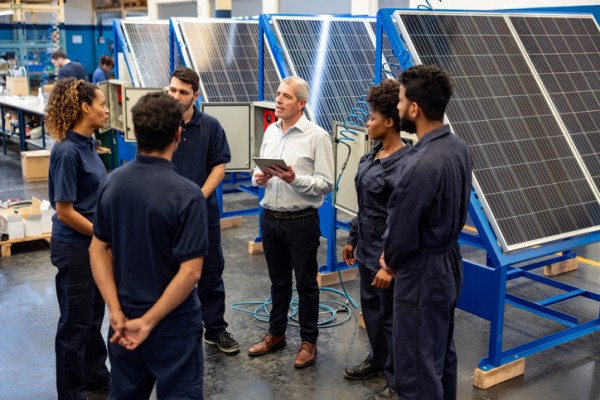Urgent reform needed to plug 42,000-worker gap in clean energy trades
Australia’s renewable energy workforce needs to scale up significantly to meet 2030 net zero targets and new ambitions for 2035, writes Anthea Middleton.
In its recently released 2025 Workforce Plan, Powering Skills Organisation (PSO) warned that without a dramatic increase in the skilled energy trades workforce, Australia’s race to net zero could stall. The government-established Jobs and Skills Council (JSC) flagged a critical and long-term labour shortage in the energy trades, with modelling indicating that to meet workforce requirements for 2030, the number of energy apprentices in training in 2024 would need to be 40% greater than has been reported.
ADVERTISEMENT
Moreover, this increase should have begun at least a decade ago.
This delay has resulted in a current shortfall of about 22,000 apprentices, with a projected shortage of 42,000 qualified energy trades workers by 2030. That shortage will only worsen by 2050 unless urgent action is taken to lift apprentice numbers and capacity.
One of ten national JSCs established in 2023 by the Australian Government, PSO collaborates with governments, industry, unions and training providers to build the skilled workforce needed to deliver the clean energy transition, meet our net-zero targets, and support energy-related roles across the economy.
PSO welcomes the Government’s commitment to cut Australia’s carbon emissions by 62-70% of 2005 levels by 2035, underpinned by new policy support in the industrial, transport and electricity sectors.
As Prime Minister Anthony Albanese noted when announcing the 2035 target, reaching the upper limits of the target range will require a “lean in” by all levels of government and the private sector.
Workforce planning is a critical part of that effort. If we get it right now, we can deliver a just transition that provides safe, stable and highly skilled careers for Australians while helping the world address climate change. We have a once-in-a-generation opportunity to prepare our labour and training markets for a fundamentally different future.
The challenge now is to remove some critical bottlenecks that are holding back growth – including a shortage of trainers, limited training infrastructure, and employers unable to take on apprentices despite high demand. We must ensure people can access the training and support they need to succeed.
In addition, there is a rapidly growing need for broader skills acquisition, supported by cultural change across the energy sector. Electrification, decarbonisation and digitalisation are driving fresh skills demands, while cultural change is essential to attract and retain underrepresented cohorts such as women and First Nations peoples.
Both challenges must be addressed together. A focus on one without the other will not deliver the deep and lasting change the sector requires.
On behalf of the sector, PSO has developed a set of actionable policy recommendations for targeted reforms by the Federal, State and Territory governments. They are:
- Include development of a national Continuing Professional Development framework as part of the Government’s existing work on developing a national licensing scheme for electrical tradespeople, and ensure the national framework will support upskilling the existing workforce in new and emerging technologies critical to decarbonisation.
- Extend the Clean Energy Training Investment Fund beyond its initial term to become a recurrent, ongoing program to reflect the continuing and growing need to train the workforce in clean energy technologies.
- Extend the coverage of the Australian Skills Guarantee to include all federally funded renewable energy and transmission projects; introduce quotas for first and second-year apprentices and mature-aged apprentices.
- Reform national Work Health and Safety regulations to require gender-specific amenities and personal protective equipment for women in trades.
- Evaluate existing initiatives to increase the number of energy trainers, with PSO to work with the Government during the delivery of the $30 million package aimed at “turbocharging the VET teacher, trainer and assessor workforce for clean energy”.
- Develop a national strategy to boost uptake in apprenticeships (including a dedicated strategy for energy trades) and overcome outdated perceptions of VET through improved careers education and support for career influencers.
These proposed recommendations are designed to unlock policy, regulatory and funding levers that will both expand the capacity of the training system and accelerate the growth and upskilling of the workforce.
These recommendations are detailed in PSO’s newly released Electrifying the Future: Policy Report 2025, which translates insights from the Workforce Plan into a clear roadmap for action. The report sets out six policy priorities designed to remove systemic barriers, modernise training infrastructure and drive cultural change across the energy sector. It’s a call to arms for government and industry to work together to future-proof Australia’s clean energy workforce.
We applaud the Government for the actions it has taken to date, including Fee-Free TAFE and its $91 million investment towards skilling the clean energy workforce. But as PSO’s research shows, there is still more to do.
The Electrifying the Future report provides policymakers and industry leaders with the practical levers needed to close the workforce gap – from national licensing reform and gender-equitable safety standards to expanding the Clean Energy Training Investment Fund and establishing a national CPD framework. Media are encouraged to review the report to see how these reforms can ensure Australia delivers on its 2035 climate ambitions while creating thousands of secure, future-focused jobs.
We look forward to working with the Government on the further decisive actions needed to close the skills gap and build the workforce Australia needs for the future.
-
ADVERTISEMENT
-
ADVERTISEMENT


